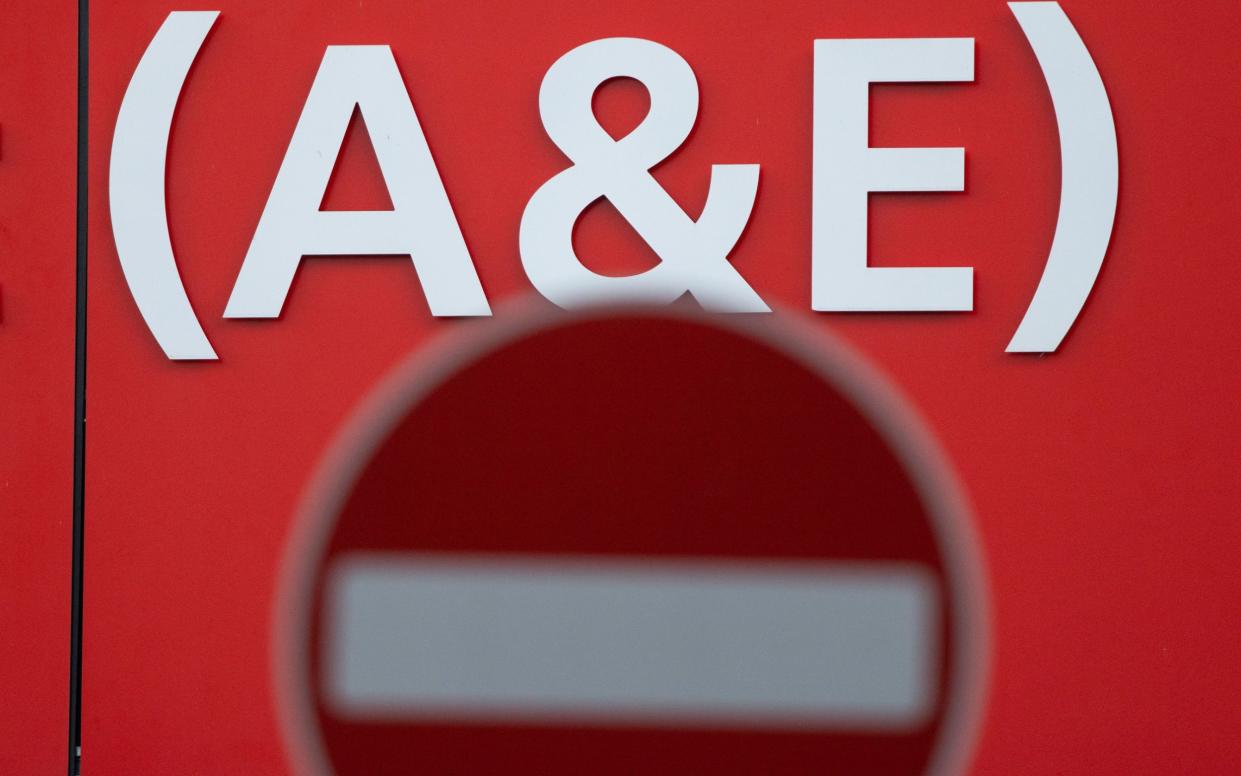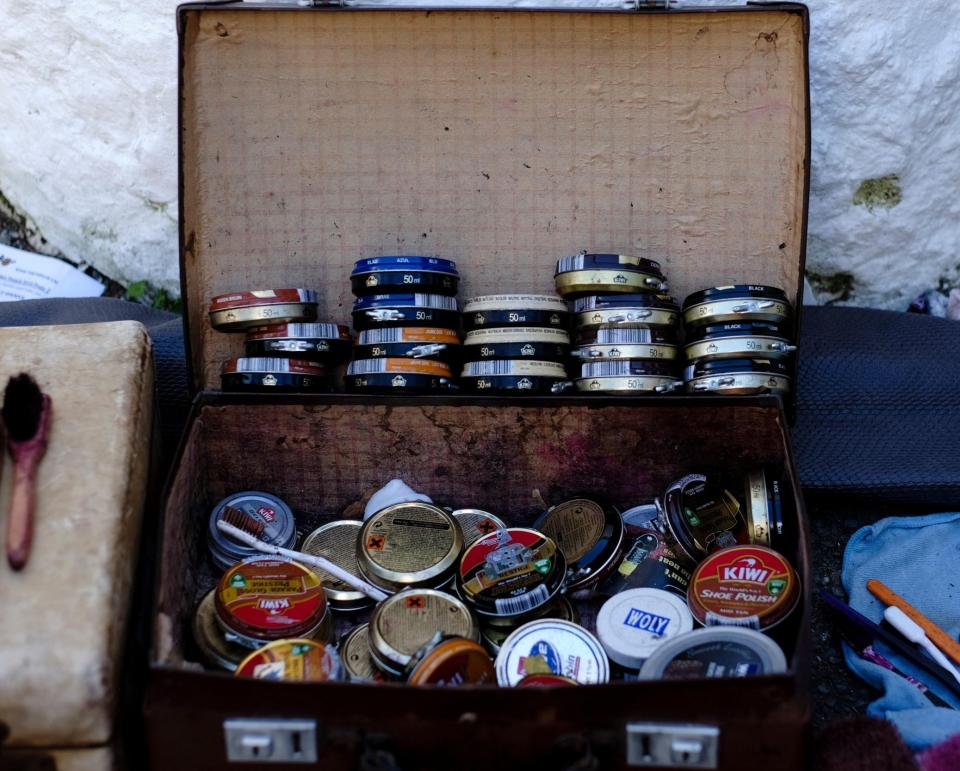Letters: A&E departments overwhelmed by patients with nowhere else to turn

SIR – If my experience is anything to go by, it is no surprise that accident and emergency care is on the brink.
The message from my GP surgery on December 23 said that, while it was closed over Christmas and New Year, patients should call 111 for minor matters and 999 for emergencies.
Martin Moyes
Holt, Wiltshire
SIR – The situation in A&E departments has been declared “shocking”. The response from the Government is simply to say there are more personnel working in the NHS than ever before.
However, this only points to the increase in NHS personnel who have no face-to-face duties with patients. This is the fault of many governments of differing persuasions over the past 30 years. Staff numbers alone do not ensure the meaningful care of patients.
Dr Malcolm Freeth
Bournemouth, Dorset
SIR – James Le Fanu highlights the IFS report showing that the numbers of consultants, doctors, nurses and managers in the NHS have all risen substantially since 2019, yet the numbers of patient appointments and admissions have decreased recently. It is now being posited that hundreds of patients are dying unnecessarily because of problems with admissions.
The single biggest identifiable factor in delays in admissions is apparently a lack of available beds on wards, leading to ambulance queues outside A&E departments. This problem is generally attributed to “bed blocking”, whereby patients capable of going home are unable to do so owing to the lack of a suitable care package.
Whatever happened to convalescent wards, where patients recovering from operations or treatment could spend some time in a medical setting regaining their health? These were more lightly staffed than major wards but ensured that any post-operative issues did not require readmission via A&E. Their reintroduction would also provide an off-ward location for patients awaiting care packages, freeing up beds and thus facilitating smoother transfers from ambulances into hospitals.
R T Britnell
Canterbury, Kent
SIR – Dr Le Fanu points out that productivity in the NHS has steadily declined.
One factor is undoubtedly an increasing focus on patient safety. The highest quality of care needs to be delivered, and the risks to the patient minimised. But there are also now risks to staff and institutions from litigation, and adverse external scrutiny from the Care Quality Commission and the media.
Without a concomitant emphasis on efficiency, the consequence is a slowing down of process and a lack of innovation. It is here that I suggest the NHS could learn much from independent providers.
Denis Wilkins FRCS
Liskeard, Cornwall
Sunak’s inertia
SIR – Despite being a long-term Conservative Party member, I did not have a say in the appointment of Rishi Sunak as Prime Minister.
What does he stand for, apart from (supposedly) financial stability?
His fiscal policies are piling hardship on many; he has delayed or scrapped vital reforms; and he has made no attempt to deal with the bloated non-medical side of the NHS.
As far as I can see, he is going nowhere and doing nothing. On the rare occasions he appears, he talks big but does little, rather like Tony Blair.
We have no hope of winning the next general election with him in charge. I keep paying my fees, but they are to the party, not the PM.
David Wallin
Nottingham
SIR – My Happy New Year message from the Conservative Party: a 56 per cent increase in the membership fee.
In other words: “Welcome to Rishinomics. We waited until January in the hope that you might have forgotten how we twice rejected your chosen leaders in favour of MPs you had rejected. You may have forgotten, too, that we threatened to change our rules to avoid a ‘wrong result’ and even cut you out completely.”
Peter Bartlett
Farnborough, Hampshire
Honouring faith
SIR – The appointment of the Chief Rabbi, Ephraim Mirvis, to a knighthood is richly deserved, but also has wider significance.
Bestowing honours on faith leaders is an important way of highlighting Britain’s multi-faith landscape. Rabbi Mirvis’s five immediate predecessors in the role were all honoured. Knighthoods were conferred on Jonathan Sacks (2005), Immanuel Jakobovits (1981) and Israel Brodie (1969), with peerages for the more recent two. Joseph Hertz was made a Companion of Honour in 1943, and his predecessor Hermann Adler was given a CVO in 1909. Indeed, he developed such a rapport with Edward VII that the king referred to him as “my Chief Rabbi”.
The recognition of faith leaders applies not only to the Jewish community but to other minority faith groups as well. The honours system helps to recognise and celebrate Britain’s kaleidoscope of faiths.
Zaki Cooper
London NW4
SIR – I heartily congratulate those worthy citizens who have been recognised for their service to society in the New Year Honours list.
However, in 2023, and at the beginning of this new Carolean era, shouldn’t we be dispensing with the word “Empire” in the honours that are conferred? Surely it is time for “Commonwealth” to supplant it.
Roger A Lounds
Christchurch, Dorset
Flipping the script
SIR – Regarding handwriting (Letters, December 31), as a dyslexic I developed a scribble to avoid sarcastic comments from my English teacher.
As a games avoidance technique, meanwhile, I hid in the library and discovered calligraphy, learning the beauty of gothic, italic and uncials before copperplate.
I still use a fountain pen but am grateful for spellcheck software.
Graphology once was a tool that went a long way at parties. People wanted to know what their writing revealed about them. I was an amateur but it gave us all a laugh.
David Hyman
Manchester
Dentistry in crisis
SIR – Government-organised dentistry in the NHS is continuing to fail the public badly, despite the workers trying their best, with many warnings both before and since Covid.
It is said that one should never put down to malice what can be explained by incompetence. But after such deep incompetence over more than a decade, one really must ask: do governments, civil servants and ministers hate dentists?
As more dental practices go partly or wholly private, forever, the Government just repeats the same sound bites, saying it is working on reform. But little changes. Such sound bites take the public for fools.
NHS dentistry is not, in fact, difficult to fix, so how badly must the Government be ruining everything else it attempts to organise? It isn’t dentists like us whom people should be afraid of but rather those in power – especially during this winter of discontent.
Tony Kilcoyne
Hana Tofighi
Ravikumar Chandarana
Barry Rosenbloom
Natasha Crossley
Jonathan Munns
Rob Bate
Benjamin Watcyn-Jones
Sanjeev Bedi
David Mee
Gerard Cummings
Claire Woodhouse
Timothy Hodges
Alexandra Staines
Joseph Hargraves
Annie Keward
Mustafa Belim
Smitha Walsh
Abigail Jones
Chandan Sharma
Baldeep Singh Jalf
Sagar Patel
Corinne Clemens
Angela Northfield
Ajay Mathur
Grace Marks
Mehul Vithlani
Stephen Butler
Rebecca Parkes
Mirela Rodica Vlaicu
Manu Cherian
Osama Al-Okati
Rebecca Nathan
Yatin Nanavati
Rachel Morrow
Reem Elia
Olivia Nixon
Keira Malone
Carla Irving
Dimple Shah
Bethan Tocknell
Joanna Batt
James Mehta
David Chong Kwan
Jonathan Baron Poznansky
Ritesh Lad
Roopal Parmar
Kush Sikka
Naveed Ahmed
Anneliese Pantin
Edward Coppen
Jacqueline Dean
Amarjit Jalif
Supriya Prasad
Ahmed Giaziri
Arthur McGroarty
Colin Langley
Mike Day
Timothy Martin
Paul Isaacs
Mike Powell
Simon Gallier
Richard Courtney
Michael Pearson
Samir Shah
Edward Burton
Manish Vyas
Jade Michael
Susan Hanson
David Watson
Finbar Francis Bryson
Alexandra Furness
Zahir Kaderbhai
Hiten Patel
Iain Soulsby
Opeoluwa Sodeinde
Animole Jiji
Andy Bates
Vishal Kumar
Tony Smith
Phillip Gale
Andy Clayton
Narinder Kondel
Eleanor Hewitt
Humaira Khaja
Nicholas Gibb
David Cheung
Mohammed Akhtar
John Barry
Laura Wilson
Behnam Zanjani
Stephan van Vuuren
Zafar Khan
Dilhani Silva
Aman Bharti
Zaki Kanaan
Shazia Ahmed
Rajiv Ruwala
Danny Pretorius
Rita Bagga
David Ayre
Sophie McGery
Cashless churches
SIR – I was disappointed to read that those attending the Bath Abbey carol service were unable to make cash donations (Letters, January 2).
At a time when all institutions – the Church included – are being implored to be inclusive, this is surely a form of discrimination against those who wish to make cash donations, as well as those who may have difficulty budgeting or are on limited incomes.
Furthermore, it has been demonstrated that being able to pay by card often leads people to spend more money. Should churches be encouraging their congregations to spend beyond their means?
Robert Taylor
Nottingham
SIR – Churches must continue to accept cash donations.
Years ago, when my father was on the village church council, one of his fellow councillors expressed shock that the Communion plate should include small change rather than the suggested notes.
“Ah, that would be me,” he said. “I put in my contribution, then I empty my pockets as well.”
Sheila May
Bradford-on-Avon, Wiltshire
Is it time to start stockpiling shoe polish?

SIR – As an old-fashioned shoe-polisher, I am upset to learn that the manufacturer of Kiwi polish plans to stop selling it in Britain.
What sort of shelf-life does shoe polish have? I am tempted to buy as much as possible before it disappears completely.
Anne Jappie
Cheltenham, Gloucestershire
SIR – Every night of my working life I cleaned my shoes, as well as those of my daughters and wife. My shoes received a spit polish, and I would also shine the leather between the sole and the heel, as my father had taught me to do.
He told me that you can determine a great deal about a person by the state of his or her shoes. I’m afraid I judged people in this way throughout my career and still find it a habit hard to drop. I certainly will not venture out without freshly polished shoes, and will be buying up all the Kiwi Parade Gloss I can find.
Tim Oldfield
Wye, Kent
SIR – For more than 65 years I have been using Kiwi polish on my leather shoes. I do not have trainers, so what am I supposed to do now?
David Godsal
Winsford, Somerset
SIR – While I was doing my National Service in the RAF, at the station cinema an advertisement for Kiwi shoe polish was shown.
When the voiceover insisted there was “nothing like it”, we all shouted: “Cherry Blossom!”
Robert Rodney
Motherwell, Lanarkshire
Futile Covid checks for travellers from China
SIR – Gregory Shenkman (Letters, January 2) supports Covid checks for passengers flying to Britain from China because of the risk of new variants.
Any variant with greater transmissibility than the current omicron mutation will spread around the world rapidly, regardless of what we do. Most people in Britain have had exposure to Covid, either through vaccination or natural infection, and there is nothing more we can do except learn to live with this virus – whatever new incarnations arrive.
China has shown that restrictions don’t work, so let us not just keep repeating the same mistakes.
Dr David Walters
Burton Bradstock, Dorset
SIR – With these checks for travellers from China, I sense that the Government is once again shutting the stable door after the horse has bolted.
Why is this Government always so reluctant to act on the issues that really matter? And if it does act, why is it then always inexcusably incompetent?
Stefan Badham
Portsmouth, Hampshire
Letters to the Editor
We accept letters by post, fax and email only. Please include name, address, work and home telephone numbers.
ADDRESS: 111 Buckingham Palace Road, London, SW1W 0DT
FAX: 020 7931 2878
EMAIL: dtletters@telegraph.co.uk
FOLLOW: Telegraph Letters on Twitter @LettersDesk

